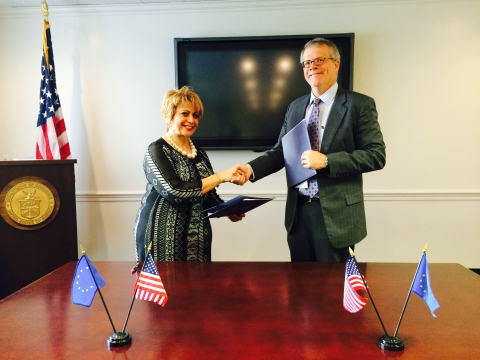Apr232015
Posted at 3:19 PM
Yesterday, U.S. Deputy Secretary of Commerce Bruce Andrews signed a Cooperation Arrangement between the U.S. Department of Commerce and the European Commission’s Directorate-General for Internal Market, Industry, Entrepreneurship and SMEs (DG GROWTH). The agreement aims to makes it easier for clusters and their member businesses in the United States and the European Union to form strategic partnerships across the Atlantic.
During the signing ceremony, Deputy Secretary Andrews highlighted the Commerce Department’s commitment to supporting regional innovation clusters to help grow our economy, create jobs, and make small and medium-sized businesses more competitive in the global marketplace. He added that the agreement with DG GROWTH is a part of Commerce’s long-standing partnership with the European Commission on initiatives to promote trade, investment and innovation on both sides of the Atlantic.
Clusters are geographic concentrations of interconnected industries and supporting organizations that make regions uniquely competitive for jobs and private investment. According to research from Harvard Business School's Institute for Strategy and Competitiveness, regional clusters are a prominent feature of successful and growing economies: they drive regional competitiveness and entrepreneurship, and underlie new business growth. They also increase our nation’s global competitiveness.
The economies of the United States and the European Union (EU) account for about half of global GDP and a third of global trade. The $1 trillion in annual two-way trade supports roughly 13 million jobs on both sides of the Atlantic. The nearly $4 trillion in total transatlantic investments directly supports seven million American and European jobs, and millions more indirectly. United States-EU flows in research and development are the most intense between any two international partners, with mutual investments exceeding $60 billion annually. Millions of visitors crossing the Atlantic include entrepreneurs, researchers, teachers, and trainees, who contribute to U.S. and EU collaboration in research and development, innovation, and growth.
Through the Cooperation Arrangement signed today, Commerce and DG GROWTH will:
- Build a collaboration platform based on the new U.S. Cluster Mapping and Registry (clustermapping.us) and similar EU cluster mapping websites;
- Encourage cluster, cluster businesses and supporting organizations to voluntarily register on these websites in order to attract strategic partners across the Atlantic;
- Conduct outreach in the United States and the EU about the benefits of and opportunities for cluster cooperation;
- Organize matchmaking and networking opportunities at conferences and trade shows; and
- Exchange best practices on supporting the growth and development of clusters.
Commerce’s contribution will be led by the International Trade Administration (ITA) and the Economic Development Administration (EDA). ITA has a global network of experts located in more than 100 U.S. cities and 20 countries in the European Union that give U.S. businesses access to services, such as counseling on developing an international business strategy and increasing brand awareness abroad, and connects businesses with new markets, business partners and customers. In addition, ITA provides easy access to information about federal-level programs and services related to business investment. EDA funded the development of the U.S. Cluster Map and Registry, and leads the federal economic development agenda by promoting competitiveness and by preparing the nation’s regions for growth and success in the worldwide economy. EDA makes investments in economically distressed communities in order to create jobs for U.S. workers, promote American innovation, and accelerate long-term sustainable economic growth.


